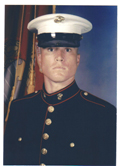

![]()
THE DEFINITION OF A FIGHTER
Brian Knoblock: 1: combat veteran 2: surfer 3: fighter
San Clemente Times
by Andrea Swayne
There are those among us who we easily refer to as fighters. We all know them. Some fight for the glory of sport. Some scrap their way to the top of the corporate ladder. Some speak out to campaign for what they believe in. Life is, after all, one big struggle. A struggle that, when well fought, can result in a very satisfying experience. Hardships overcome by sheer will and determination are the hallmarks of the
still young, but already rich, life of 28-yearold San Clemente resident Brian Knoblock.Knoblock, one of six siblings, spent most of his youth growing up in Southern California. It’s no wonder then that he caught the surfing bug at an early age and like many surf stoked groms had big dreams of becoming a professional surfer.
During his school years he moved around quite a bit, dividing time between his parents, Steve and Julie Knoblock, who loved and taught him well but did not make it together as a couple. His living arrangements often found him miles away from any beach. Even though surfing was not an everyday occurrence during a good portion of his school years, Knoblock nurtured a passion for the sport, riding waves at every opportunity and joining the school surf team whenever he happened to be attending a school that had one. Snowboarding and dirt biking also became part of his athletic repertoire during this timeas his proximity to snow and dirt was often closer than his proximity to the ocean. Aftergraduating from Riverside Christian High School, his wanderlust took him to both the
mountains of Alaska and the waves of Hawaii before returning to his California home and the family that he missed. In the year 2000, Knoblock quenched his first thirst for a fight by becoming a Bureau of Land Management firefighter in Northern California where he worked to help knock down the infamous Blue Fire of August 2001 which devastated 34,500 acres of Lassen and Modoc county wilderness. Fighting fires was satisfying work but the dream of being a surfer had not gone away. By a twist of fate, wearing a seatbelt—he was thrown from the vehicle as it struck another car and rolled on the San Vincente Freeway near San Diego. Knoblock’s rehabilitation took nearly two years. While his spinal cord was spared and youth was on his side, Knoblock was required to wear a back brace
and undergo months of grueling physical therapy. “I had to learn how to walk again with a walker. It was scary and emotionally heavy but nothing compared to what my roommate at the rehab hospital was goingthrough,” said Knoblock. “When I got down or grumpy or sick from my medication, he would always tell me, ‘hey, at least you’re going to walk out of here.’ That always put things into perspective for me.” His roommate was a paraplegic with no hope of recovery. During his convalescence, Knoblock found yet another reason to fight—besides the struggle to heal—in the terrorist attacks of 9-11. Having grown up around afamily with many military service personnel, Knoblock found in their example his new calling. He wanted desperately to be a Marine. Of course this would mean more
than simple rehabilitation. He would now have to find the strength to regain the level of fitness he had before the accident—maybe even surpass it. Being accepted into the Marine Corps would require him to be in top physical form. He set out to fight for his health so that he could go overseas and
fight for his county.
In June of 2003, Knoblock officially became a Marine training to go to war. He found himself based in Fallujah, Iraq, as point man in a Force Protection Unit, a job that not only requires top physical condition but keen senses, strength of mind and a prowess for decision making. As point man, Knoblock was often first on the scene when his force protection unit patrolled a new area or escorted a convoy in on a mission. Knoblock refers to his time in Iraq as a time of grasping yet another new perspective on life, much as he did when he was in the hospital back in the States. “I saw so many lives being taken needlessly. It really made me value life more,” said Knoblock. “Freedom is not free. I saw it first hand and lost a lot of good friends over there. I met some of the people—mostly the younger generation of Iraqis—who were looking to us [the United States] for help. I felt like, to them, we represented hope for the future. I saw it in their faces. It’s hard to explain exactly what the whole experience did to me. It’s very emotional.” Knoblock began his time in Iraq as a Lance Corporal and was presented the rank of Meritorious Corporal by Lieutenant General Sattler, in the field, as a tribute to his country.
In June of 2003, Knoblock officially became a Marine training to go to war. He found himself based in Fallujah, Iraq, as point man in a Force Protection Unit, a job that not only requires top physical condition but keen senses, strength of mind and a prowess for decision making. As point man, Knoblock was often first on the scene when his force protection unit patrolled a new area or escorted a convoy in on a mission. Knoblock refers to his time in Iraq as a time of grasping yet another new perspective on life, much as he did when he was in the hospital back in the States. “I saw so many lives being taken needlessly. It really made me value life more,” said Knoblock. “Freedom is not free. I saw it first hand and lost a lot of good friends over there. I met some of the people—mostly the younger generation of Iraqis—who were looking to us [the United States] for help. I felt like, to them, we represented hope for the future. I saw it in their faces. It’s hard to explain exactly what the whole experience did to me. It’s very emotional.” Knoblock began his time in Iraq as a Lance Corporal and was presented the rank of Meritorious Corporal by Lieutenant General Sattler, in the field, as a tribute to his. Read More..


